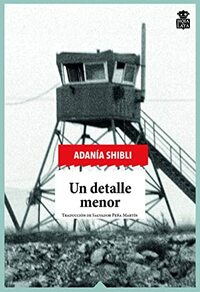Take a photo of a barcode or cover
one of the most brutal books I’ve ever read. the anxiety, danger of border-making and border-crossing, of occupation. the way the dog, and gasoline scent, reappear in the later woman’s life (and perhaps even the ghost of the first woman)? These clues that the violence will simply reinvent itself, always recur. The impossibility of uncovering the victim’s story when the museums & archives are so intent on a different one.
challenging
dark
fast-paced
Plot or Character Driven:
Plot
Strong character development:
No
Loveable characters:
No
Diverse cast of characters:
Yes
Flaws of characters a main focus:
N/A
challenging
dark
emotional
sad
medium-paced
Plot or Character Driven:
A mix
Strong character development:
N/A
Loveable characters:
Complicated
Diverse cast of characters:
N/A
Flaws of characters a main focus:
N/A
As I was reading this book, the first half had me discontented. I didn’t care about this man and the 20 times we recounted him washing his sweat. I didn’t care about his spider bite, and I figured I’d probably end up giving the book 3 stars max.
Then I finished the book. I will not get over the poignancy of the past, present and soon-to-be-killed Palestinian women. Nothing has changed and is hard-pressed ever to.
Then I finished the book. I will not get over the poignancy of the past, present and soon-to-be-killed Palestinian women. Nothing has changed and is hard-pressed ever to.
challenging
emotional
reflective
tense
slow-paced
I personally struggled with the writing style and the repetitive, detailed descriptions- it obviously served a literary purpose which I can appreciate but ended up with the book dragging for me at the end and losing some of its impact
That being said this feels like a very important read to discover more about the day to day life of a Palestinian under occupation and I'm glad I read it.
That being said this feels like a very important read to discover more about the day to day life of a Palestinian under occupation and I'm glad I read it.
dark
reflective
tense
slow-paced
Plot or Character Driven:
A mix
The rating is strictly for the writing style which was tedious and shouldn't have been as overly descriptive. It should've focused more on the characters and their feelings and actions. However, I think it's an important read about the horrors of war and colonization.
This novel is short but deeply impacting. Shibli and Jaquette demonstrate how the narrative, history and “minor details” of conflict are controlled, manipulated and obscured by the victors. The book is split into two halves.
The first half hauntingly recounts just one of many horrific incidences of the first Arab-Israeli War. The writing is disconcertingly lacking in emotion and speech. The distant third person narrator clinically and scientifically describes only the actions of a nameless characters, including the cruel, repetitive rape of a young Bedouin girl.
The second half is set in modern day Palestine with echoes of the past. The first person and, again, nameless narrator is an autistic woman, recounting her anxious thoughts in a continuous, single paragraph. She negotiates the hostile realities - checkpoints, bombs, changing maps, a generally repressive atmosphere - of living in occupied territory in order to uncover the truth of what happened to a girl decades ago. Throughout this narrative, I felt a rising and nagging feeling of discomfort that culminated in the final scene.
The first half hauntingly recounts just one of many horrific incidences of the first Arab-Israeli War. The writing is disconcertingly lacking in emotion and speech. The distant third person narrator clinically and scientifically describes only the actions of a nameless characters, including the cruel, repetitive rape of a young Bedouin girl.
The second half is set in modern day Palestine with echoes of the past. The first person and, again, nameless narrator is an autistic woman, recounting her anxious thoughts in a continuous, single paragraph. She negotiates the hostile realities - checkpoints, bombs, changing maps, a generally repressive atmosphere - of living in occupied territory in order to uncover the truth of what happened to a girl decades ago. Throughout this narrative, I felt a rising and nagging feeling of discomfort that culminated in the final scene.
dark
emotional
reflective
sad
tense
medium-paced




